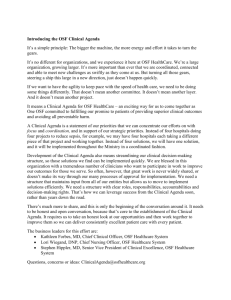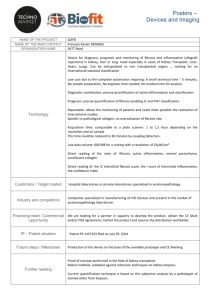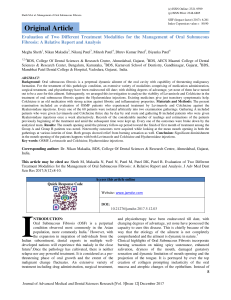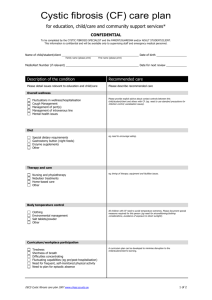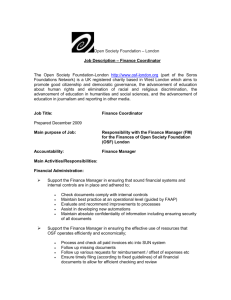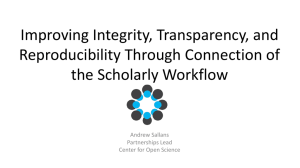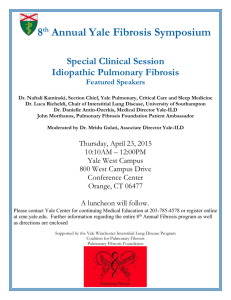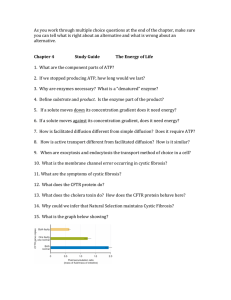Document 13310850
advertisement
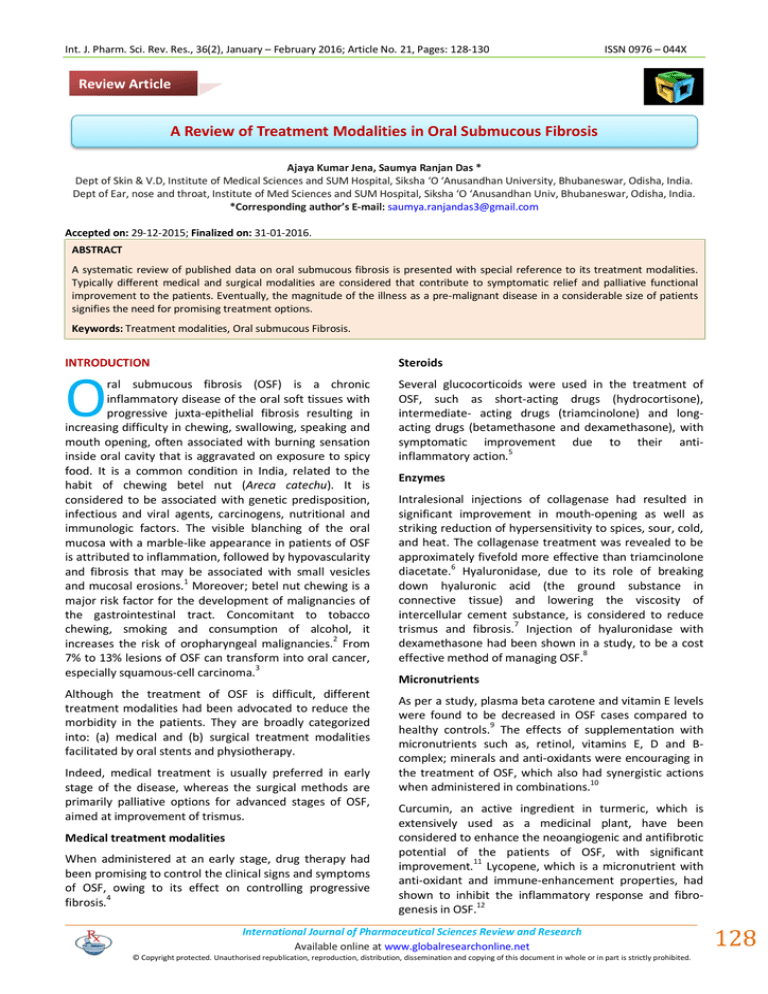
Int. J. Pharm. Sci. Rev. Res., 36(2), January – February 2016; Article No. 21, Pages: 128-130 ISSN 0976 – 044X Review Article A Review of Treatment Modalities in Oral Submucous Fibrosis Ajaya Kumar Jena, Saumya Ranjan Das * Dept of Skin & V.D, Institute of Medical Sciences and SUM Hospital, Siksha ‘O ‘Anusandhan University, Bhubaneswar, Odisha, India. Dept of Ear, nose and throat, Institute of Med Sciences and SUM Hospital, Siksha ‘O ‘Anusandhan Univ, Bhubaneswar, Odisha, India. *Corresponding author’s E-mail: saumya.ranjandas3@gmail.com Accepted on: 29-12-2015; Finalized on: 31-01-2016. ABSTRACT A systematic review of published data on oral submucous fibrosis is presented with special reference to its treatment modalities. Typically different medical and surgical modalities are considered that contribute to symptomatic relief and palliative functional improvement to the patients. Eventually, the magnitude of the illness as a pre-malignant disease in a considerable size of patients signifies the need for promising treatment options. Keywords: Treatment modalities, Oral submucous Fibrosis. INTRODUCTION Steroids O ral submucous fibrosis (OSF) is a chronic inflammatory disease of the oral soft tissues with progressive juxta-epithelial fibrosis resulting in increasing difficulty in chewing, swallowing, speaking and mouth opening, often associated with burning sensation inside oral cavity that is aggravated on exposure to spicy food. It is a common condition in India, related to the habit of chewing betel nut (Areca catechu). It is considered to be associated with genetic predisposition, infectious and viral agents, carcinogens, nutritional and immunologic factors. The visible blanching of the oral mucosa with a marble-like appearance in patients of OSF is attributed to inflammation, followed by hypovascularity and fibrosis that may be associated with small vesicles and mucosal erosions.1 Moreover; betel nut chewing is a major risk factor for the development of malignancies of the gastrointestinal tract. Concomitant to tobacco chewing, smoking and consumption of alcohol, it increases the risk of oropharyngeal malignancies.2 From 7% to 13% lesions of OSF can transform into oral cancer, 3 especially squamous-cell carcinoma. Although the treatment of OSF is difficult, different treatment modalities had been advocated to reduce the morbidity in the patients. They are broadly categorized into: (a) medical and (b) surgical treatment modalities facilitated by oral stents and physiotherapy. Indeed, medical treatment is usually preferred in early stage of the disease, whereas the surgical methods are primarily palliative options for advanced stages of OSF, aimed at improvement of trismus. Medical treatment modalities When administered at an early stage, drug therapy had been promising to control the clinical signs and symptoms of OSF, owing to its effect on controlling progressive fibrosis.4 Several glucocorticoids were used in the treatment of OSF, such as short-acting drugs (hydrocortisone), intermediate- acting drugs (triamcinolone) and longacting drugs (betamethasone and dexamethasone), with symptomatic improvement due to their antiinflammatory action.5 Enzymes Intralesional injections of collagenase had resulted in significant improvement in mouth-opening as well as striking reduction of hypersensitivity to spices, sour, cold, and heat. The collagenase treatment was revealed to be approximately fivefold more effective than triamcinolone diacetate.6 Hyaluronidase, due to its role of breaking down hyaluronic acid (the ground substance in connective tissue) and lowering the viscosity of intercellular cement substance, is considered to reduce trismus and fibrosis.7 Injection of hyaluronidase with dexamethasone had been shown in a study, to be a cost effective method of managing OSF.8 Micronutrients As per a study, plasma beta carotene and vitamin E levels were found to be decreased in OSF cases compared to healthy controls.9 The effects of supplementation with micronutrients such as, retinol, vitamins E, D and Bcomplex; minerals and anti-oxidants were encouraging in the treatment of OSF, which also had synergistic actions when administered in combinations.10 Curcumin, an active ingredient in turmeric, which is extensively used as a medicinal plant, have been considered to enhance the neoangiogenic and antifibrotic potential of the patients of OSF, with significant improvement.11 Lycopene, which is a micronutrient with anti-oxidant and immune-enhancement properties, had shown to inhibit the inflammatory response and fibrogenesis in OSF.12 International Journal of Pharmaceutical Sciences Review and Research Available online at www.globalresearchonline.net © Copyright protected. Unauthorised republication, reproduction, distribution, dissemination and copying of this document in whole or in part is strictly prohibited. 128 Int. J. Pharm. Sci. Rev. Res., 36(2), January – February 2016; Article No. 21, Pages: 128-130 Topical application of Aloe Vera, which is a natural plant extract, with anti-inflammatory, immunomodulatory and antioxidant properties that promoted wound healing, was proved to be easily available, safe to use, cost effective, 13 non-invasive and effective treatment modality for OSF. Vasodilators Pentoxifylline (Trental) is a methylxanthine derivative having vasodilating properties, which concomitantly increased mucosal vascularity. It was found in a study, to be an effective adjunct therapy in the routine management of OSF, with demonstrated relief of the symptoms.14 Hyperbaric Oxygen Therapy The effect of hyperbaric oxygen therapy in the management of OSF had been studied and its role in cellular-regulation, management of various cytokines and transcription factors for angiogenesis with resultant antiinflammatory potential at cellular and molecular levels was established.15 modify tissue remodeling in OSF to increase oral opening.21 CONCLUSION The magnitude of morbidity and premalignant potential in OSF could be addressed by combination strategies, which include the stoppage of causative ill habits, appropriate medical and surgical treatment modalities along with physiotherapy, selected according to the severity of the symptoms and stage of functional impairment. Acknowledgement: We are grateful to Dr. DK Roy, Medical Director, and Mr. G. Kar, Managing Member, IMS and Sum Hospital, for encouragements. REFERENCES 1. Haider SM, Merchant AT, Fikree FF, Rahbar MH, Clinical and functional staging of oral submucous fibrosis, Br J Oral Maxillofac Surg, 38, 2000, 12-15. 2. UweWollina, Shyam B Verma, FareediMukram Ali, KishorPatil, Oral submucous fibrosis: an update, Clin CosmetInvestig Dermatol, 8, 2015, 193-204. 3. Tilakaratne WM, Klinikowski MF, Saku T, Oral Submucous fibrosis: Review on aetiology and pathogenesis, Oral Oncol, 42, 2006, 561. 4. Xiaowen Jiang, Jing Hu, Drug Treat Oral Submucous Fibrosis: A review of the literature, J Oral Maxillofac Surg, 67, 2009, 1510-15. 5. Lai DR, Chen HR, Lin LM, Clinical evaluation of different treatment methods for oral submucous fibrosis, A 10-year experience with 150 cases, J Oral Pathol Med, 24, 1995, 402. 6. Lin HJ, Lin JC, Treatment of oral submucous fibrosis by collagenase: Effects on oral opening and eating function, Oral Dis, 13, 2007, 407. 7. Coman DR, Mccutcheon M, Zeidman I, Failure of hyaluronidase to increase in invasiveness of neoplasms, Cancer Res, 7, 1947, 383-385. 8. James L, Shetty A, Rishi D, Abraham M, Management of oral submucous fibrosis with injection of hyaluronidase and dexamethasone in grade iii oral submucous fibrosis: A Retrospective Study, Int Oral Health, 7, 2015, 82-85. 9. Gupta S, Reddy MVR, Harinath BC, Role of oxidative stress and antioxidants in aetiopathogenesis and management of oral submucous fibrosis, Ind J ClinBiochem, 19, 2004, 138141. Surgical treatment modalities Surgical treatments are mainly advocated as palliative procedures in advanced stages of OSF, to improve the extent of mouth-opening. Coronoidotomy and Masticatory Muscle Myotomy Surgical procedures such as, submucous fibrotic tissue release in combination with masticatory muscle myotomy and coronoidotomy had demonstrated the efficacy in treating trismus resulting from advanced cases of OSF.16 Reconstructive surgeries, such as platysma myocutaneous flap and palatal flap based on the greater palatine artery in combination with masticatory muscle myotomy and coronoidotomy had been revealed by studies, to be promising in relieving trismus in OSF.17,18 Laser Sugery KTP-532 laser assisted release of fibrous bands in OSF was reported to be less time-consuming and more economical than surgical flaps due to a shortened hospital stay, which result in a better patient compliance in addition to significant relief of symptoms.19 Oral Stent As reported, the use of an oral stent, adjunct to surgical procedures was considered especially when the surgical techniques were prone to relapse. The stent had to be used till the jaws had been stretched to allow the tissue to heal at the new, increased opening position of mouth.20 Physiotherapy The treatment advanced OSF primarily aims at achieving improved oral opening, which was reported to be outcomes of surgical treatment followed by physiotherapy. Simple jaw stretching exercises could ISSN 0976 – 044X 10. Maher R, Aga P, Johnson NW, Sankaranarayanan R, Warnakulasuriya S, Evaluation of multiple micronutrient supplementation in the management of oral submucous fibrosis in Karachi, Pakistan, NutritCancer, 27, 1997, 41-47. 11. Hazarey VK, Sakrikar AR, Ganvir SM, Efficacy of curcumin in the treatment for oral submucous fibrosis - A randomized clinical trial, J Oral Maxillofac Pathol, 19, 2015, 145-152. 12. Gupta S, Jawanda MK, Arora V, Mehta N, Yadav V, Role of lycopene in preventing oral diseases as a nonsurgical aid of treatment, Int J Prev Med, 6, 2015, 70. International Journal of Pharmaceutical Sciences Review and Research Available online at www.globalresearchonline.net © Copyright protected. Unauthorised republication, reproduction, distribution, dissemination and copying of this document in whole or in part is strictly prohibited. 129 Int. J. Pharm. Sci. Rev. Res., 36(2), January – February 2016; Article No. 21, Pages: 128-130 ISSN 0976 – 044X 13. Patil S, Halgatti V, Maheshwari S, Santosh BS, Comparative study of the efficacy of herbal antioxidants oxitard and Aloe vera in the treatment of oral submucous fibrosis, J Clin Exp Dent, 6, 2014, 265-270. Subramaniyan D, Platysmamyocutaneous flap for reconstruction of intraoral defects following excision of oral sub mucous fibrosis: A report of 10 cases, J Pharm Bioallied Sci, 7, 2015, 708-711. 14. Rajendran R, Rani V, Shaikh S, Pentoxifylline therapy: A new adjunct in the treatment of oral submucous fibrosis, Indian J Dent Res, 17, 2006, 190-198. 18. Khanna JN, Andrade NN. Oral submucous fibrosis: a new concept in surgical management, Report of 100 cases, Int. J. Oral Maxillofac, Surg, 24, 1995, 433-439. 15. Kumar MA, Radhika B, Gollamudi N, Reddy SP, Yaga US, Hyperbaric oxygen therapy-a novel treatment modality in oral submucous fibrosis: A Review, J Clin Diagn Res, 9, 2015, 1-4. 19. Nayak DR, Mahesh SG, Aggarwal D, Pavithran P, Pujary K, Pillai S, Role of KTP-532 laser in management of oral submucous fibrosis, J Laryngol Otol, 123, 2009, 418-421. 16. Ming CY, Ying TC, Morten K, Chan WF, Importance of coronoidotomy and masticatory muscle myotomy in surgical release of trismus caused by submucous fibrosis, Plastic Reconstr Surg, 113, 2004, 1949-1954. 17. Ramanujam S, Venkatachalam S, Subramaniyan M, 20. Le PV, Gornitsky M, Oral stent as treatment adjunct for oral submucous fibrosis, Oral surg Oral med Oral pathol Oral radiol Endod, 81, 1996, 148-150. 21. Cox S, Zoellner H, Physiotherapeutic treatment improves oral opening in oral submucous fibrosis, J Oral Patho Med, 38, 2009, 220-226. Source of Support: Nil, Conflict of Interest: None. International Journal of Pharmaceutical Sciences Review and Research Available online at www.globalresearchonline.net © Copyright protected. Unauthorised republication, reproduction, distribution, dissemination and copying of this document in whole or in part is strictly prohibited. 130
